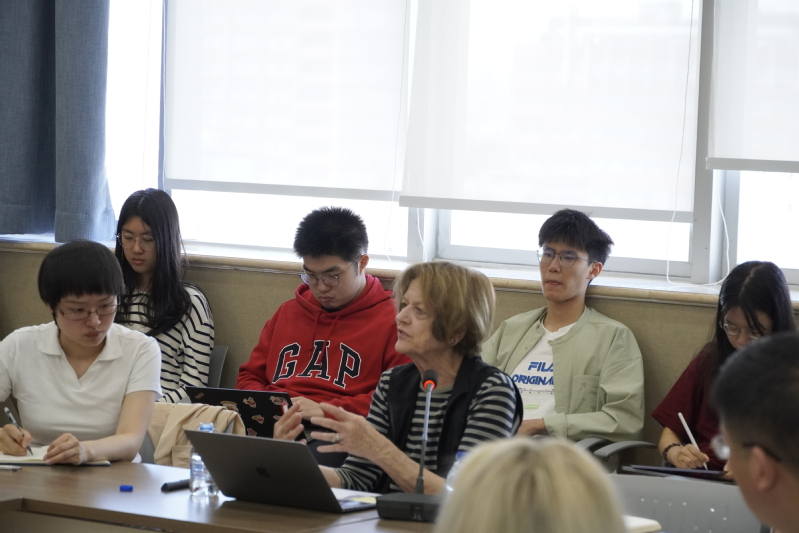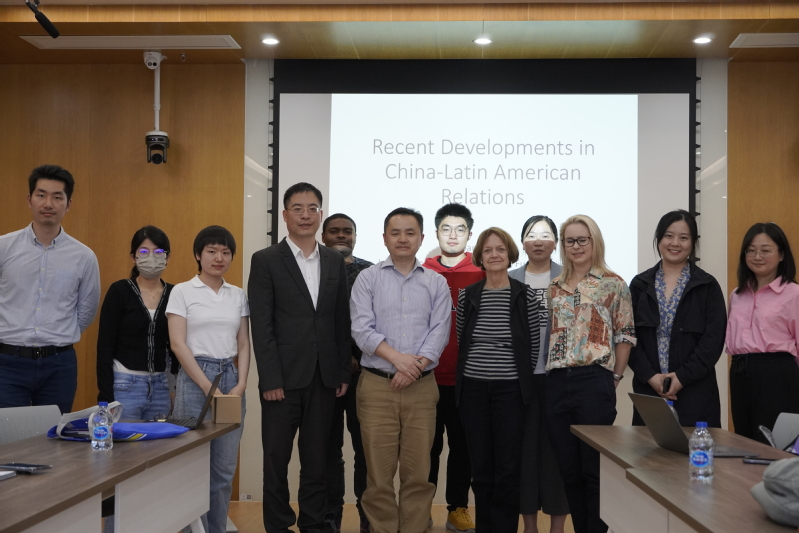
On May 23, 2023, the Institute for Global Public Policy (IGPP) hosted the 44th Fudan-LSE Lecture, inviting professor Barbara Stallings from the Watson Institute for International and Public Affairs at Brown University to give a lecture titled Recent Development in China-Latin American Relations. Dr. Haibin Niu, Director of the Institute for Foreign Policy Studies, Shanghai Institutes for International Studies, and Dr. Pippa Morgan, Lecturer at Duke Kunshan University served as discussants.

Before the lecture, Prof. Zheng Yu briefly introduced Prof. Barbara Stallings and extended a sincere welcome for her visit to IGPP. Barbara Stallings is Senior Fellow at the Watson Institute for International and Public Affairs at Brown University and Distinguished Visiting Professor in the Schwarzman Scholars Program at Tsinghua University. She previously served as the Director of the Economic Development Division of the United Nations Economic Commission for Latin America and the Caribbean. She holds PhDs in Economics (Cambridge University) and in Political Science (Stanford University) and works on the political economy of development in East Asia and Latin America. She has authored or edited 17 books and dozens of articles.
At the beginning of the lecture, Prof. Stallings gave an overall review of the current political and economic situation in Latin America. The COVID-19 pandemic has caused far greater economic and social impact on Latin America than any part of the world, with continued sluggish economic growth and a pessimistic social outlook. At the political level, the economic and social difficulties propelled left-wing forces to take power, leading to a new round of political leftist trends in Latin America. However, the leftist government may face various governance challenges in the future.
Next, Prof. Stallings pointed out that the governance challenges in Latin America may also provide opportunities for China to cooperate with the region. First, during the epidemic, China provided important assistance to Latin America, including medical equipment and vaccines, and helped the region achieve the ability of independent vaccine production. The second was the trade relations between China and Latin America. In terms of the trade structure between China and Latin America, Latin America mainly exported bulk commodities to and imported manufactured goods from China. Lithium was becoming an important category of Sino-Latin American trade and Chinese investment in Latin America. Prof. Stallings also emphasized that the strategic competition between China and the United States had a certain negative impact on the promotion of China-Latin America relations. Finally, Prof. Stallings summarized the demands of Latin American countries towards China from political and economic perspectives. Developing relations with China helped Latin America diversify its international political relationships with Latin American countries and reduce its traditional dependence on the United States and Europe. Economically, Latin America is concerned that the imbalance of the trade structure would lead to the potential danger of deindustrialization in Latin America. Also, a drop in finance raised concerns among Latin American countries about a shortage of funds for industrialization and social sectors (health, education, etc.). Looking ahead, opportunities and challenges coexisted in China-Latin America relations. Both Chinese and Latin Americans should think about how to continue this relationship and how to seek benefits and avoid harm.
After Prof. Stallings’s speech, Dr. Niu Haibin and Dr. Pippa Morgan made comments. Niu Haibin pointed out the differences among Latin American countries in the utilization of emerging strategic resources, and the impact of these differences on foreign investors. He then analyzed the reasons for changes in China's lending to Latin America from the perspectives of the COVID-19 pandemic, changes in investment concepts and standards in China's Belt and Road Initiative, and the conflict between Russia and Ukraine. Dr. Niu also pointed out the potential new areas of cooperation between China and Latin America. Dr.Pippa Morgan had a comparion between Africa and Latin America from the perspectives of Sino-economic relations, age structures of population, and funding models.

After the comments, Prof. Stallings discussed with the audience the emergence and prospect of green projects, the influence of America on the cooperation between China and Latin America, the competition among Latin American countries for projects from China, and other issues. Prof. Zheng Yu presented a gift of IGPP to Prof. Stallings, and the lecture ended successfully with warm applause.





